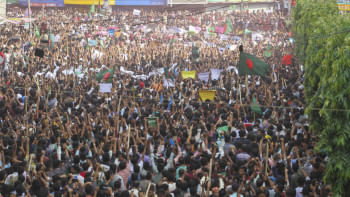Not third gender, female

For the first time in Bangladesh, two hijras (transgender) are running for councillor in the December 30 municipality polls.
They, however, had to identify themselves as females since a government decision to identify them as the third gender has not been implemented yet.
Both of them became voters as females since there was no option for their sex in the National Identity (NID) card forms.
The cabinet in November 2013 decided to identify hijras as people of the third gender and to use this sexual identity in different government forms and documents like passport and NID cards.
The Election Commission kept no option for the third gender in the nomination forms for both mayoral and councillor aspirants. The Daily Star contacted EC officials to know the reasons behind it, but no one could explain.
EC Secretariat Secretary Sirazul Islam termed the participation of the two hijras in the elections positive. He did not elaborate further.
Additional Secretary to the EC Secretariat Mokhlesur Rahman said it was their right to take part in the election. If anyone wants to participate as a third gender, he or she could write their sex next to the male and female boxes in the form.
Returning Officers, however, said the nomination of a candidate would be cancelled if there was a difference between the nomination form and the NID card regarding his or her gender.
Braving all odds, Diti and Sumi are taking part in the municipality polls in two south-western districts. Diti is running for the reserved seat for women at Kolaroa municipality in Satkhira while Sumi at Bagharpara municipality in Jessore.
Both Diti and Sumi opted to join the battle of ballots to serve the people and fight against social discrimination. Their participation in the elections has created much enthusiasm among locals and the administration.
Local Awami League has extended its support for Diti, who is also the general secretary of Jubo League Ward-9 in Kolaroa upazila.
Rights body Manusher Jonno Foundation (MJF) hailed the decision of the participation of the hijras in the polls and hoped that more would come forward and join politics for ensuring their rights.
It also demanded that the government keep the option for the third gender in all forms.
Mahuya Leya Salia, programme coordinator of MJF, said it was a positive sign that the third gender people were taking part in the local body elections.
“People will be able to learn more about them, and their attitude towards them [third gender people] will change,” she said.
Representation of the third gender in politics and election would create space for leadership development, Mahuya said, adding, “They will take part in the national elections in future.”
She demanded that the government change all forms incorporating the third gender.
Talking to The Daily Star, Diti said she wants to stand beside the helpless and the poor.
“I want to make a contribution to social change and development of roads and infrastructure in my area,” she said, adding that people in her locality took her very positively and the local AL was backing her.
Sumi contested the 2010 municipality election as a councillor candidate. She lost by only 13 votes.
She said people in her locality inspired her to take part in the polls again. “I love my people and want to stand beside them during their times of need,” she told The Daily Star.
There are 10,000 hijras living in the country, according to a survey conducted by the Ministry of Social Welfare in 2013.


 For all latest news, follow The Daily Star's Google News channel.
For all latest news, follow The Daily Star's Google News channel. 



Comments